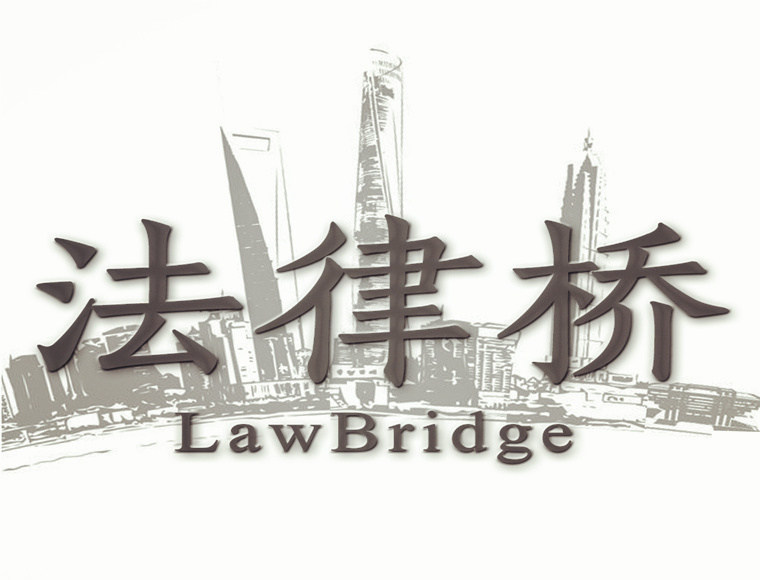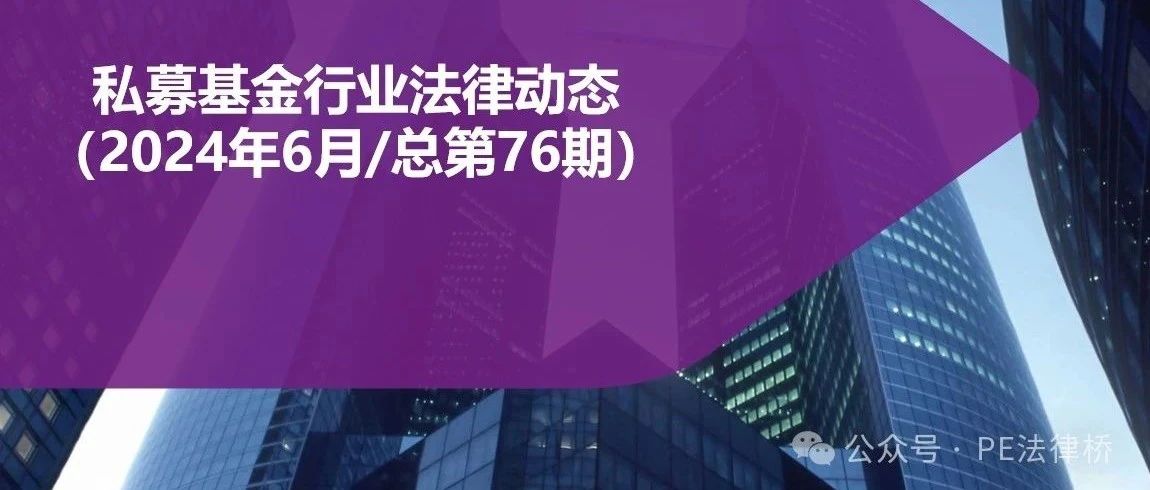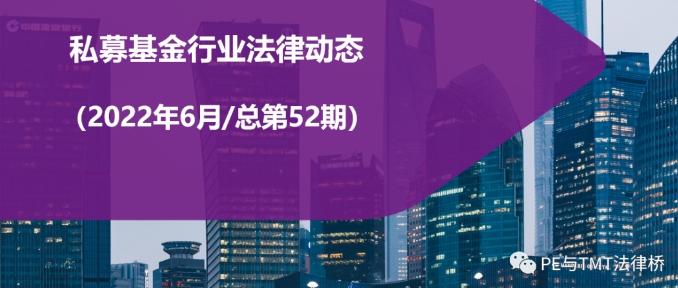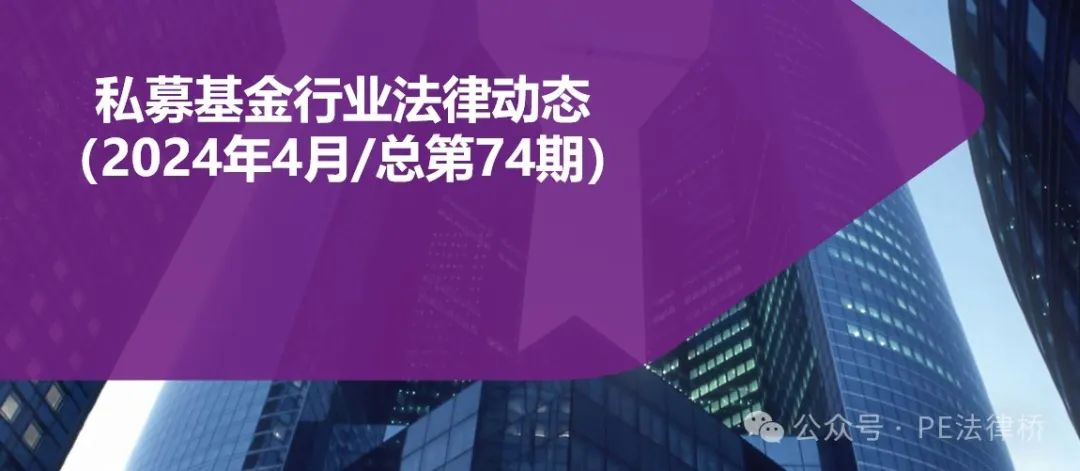Legal Trends in the Private Equity Industry (July 2024/Issue 77)
Please refer to the official name of the law and regulations
Legal service updates from Yang Chunbao's lawyer team
1. Yang Chunbao's first-level lawyer team was re-hired as a permanent legal advisor by Shenzhen Oukejian Biopharmaceutical Technology Co., Ltd.
2. Lawyer Yang Chunbao and lawyer Ju Heng's team accepted a commission from a medical device company to provide comprehensive legal services for its targeted capital reduction.
Various announcements and self-regulatory measures
of the Fund Industry Association
1
Association's various announcements
2
Disciplinary sanctions of the association
Regulatory developments
01
China Securities Regulatory Commission and other departments issued "Opinions on Further Improving the Comprehensive Punishment and Prevention of Financial Fraud in the Capital Market"
On July 5, 2024, the CSRC’s official website released a notice forwarded by the General Office of the State Council on the “Opinions on Further Improving the Comprehensive Punishment and Prevention of Financial Fraud in the Capital Market” (“Opinions on Financial Fraud”) issued by the China Securities Regulatory Commission and other departments. In the part of resolutely combating and curbing financial fraud in key areas, the “Opinions on Financial Fraud” mentioned that it is necessary to strengthen the diligence and responsibility of private equity venture capital fund managers, strengthen due diligence and post-investment management of the financial authenticity of the projects invested by the funds, and prevent fraudulent behavior.
02
The China Securities Regulatory Commission issued the "Regulations on Information Disclosure and Information Submission Management of Private Investment Funds (Draft for Comments)"
On July 5, 2024, the China Securities Regulatory Commission issued the "Draft Information Disclosure and Submission Management Provisions for Private Investment Funds (Draft for Comments)" (hereinafter referred to as the "Draft Information Disclosure Provisions") and solicited public opinions. The draft Information Disclosure Provisions consists of eight chapters and 43 articles. The main contents are as follows: In the general provisions, it is clarified that private fund managers, custodians, and service institutions shall disclose information to investors in accordance with laws, administrative regulations, and the provisions of the China Securities Regulatory Commission, and submit information to the China Securities Regulatory Commission and its dispatched agencies and associations; it is clarified that the information disclosed to investors shall be backed up on the information disclosure backup platform designated by the China Securities Regulatory Commission. In the general provisions on information disclosure, it is clarified that the objects, content, and methods of information disclosure. In the differentiated information disclosure section, it is clarified that the differentiated periodic reporting and temporary reporting requirements for private securities investment funds and private equity investment funds and the specific arrangements for the disclosure of underlying assets; it is clarified that the audit requirements for private securities investment funds involving non-custody and the comprehensive audit requirements for private equity investment funds; it is clarified that the custodian of private securities investment funds shall review and examine the net value of the fund, as well as the investor reminder and reporting requirements when specific risks are found. In the information reporting section, the regular, temporary and special reporting requirements of managers are clarified; it is clarified that private equity fund managers should submit annual operating conditions and audited annual financial reports. In the information disclosure affairs management section, it is clarified that the establishment of information disclosure and information reporting management system, strengthening the control of undisclosed fund information, and properly preserving relevant documents and materials are required; it is clarified that the shareholders, partners and actual controllers of managers cooperate in fulfilling the obligations of information disclosure and information reporting. In the supervision management and legal liability section, it is clarified that the handling and punishment for violating the provisions on information disclosure and information reporting are punished.
03
The General Office of the Shanghai Municipal People's Government issued "Several Opinions on Further Promoting the High-Quality Development of Venture Capital in Shanghai"
On July 19, 2024, the General Office of the Shanghai Municipal People's Government issued the "Several Opinions on Further Promoting the High-Quality Development of Shanghai Venture Capital" (hereinafter referred to as the "Venture Capital Opinions"), which put forward several opinions on further promoting the high-quality development of Shanghai venture capital (including angel investment): First, it emphasizes the decisive role of the market in the allocation of innovation resources, and proposes to attract qualified social capital to participate in venture capital through the guidance of fiscal funds and state-owned capital, and continue to increase support for key industries such as integrated circuits, biomedicine, and artificial intelligence; Second, it proposes to give full play to the guiding role of government investment funds, including strengthening the overall coordination of various government investment funds and state-owned funds, establishing a continuous investment mechanism, Implement preferential support policies, and optimize the assessment and evaluation mechanism of state-owned capital; third, emphasize the linkage development of venture capital and multi-level science and technology financial service system, including strengthening the linkage with market segments such as the Science and Technology Innovation Board, promoting cooperation among various financial institutions, and broadening the fundraising channels of venture capital enterprises; fourth, propose to promote the synergy between venture capital and industrial and regional development, such as actively guiding the transformation of scientific and technological innovation results, establishing a government special docking mechanism, and encouraging market-oriented mergers and acquisitions in key industrial fields; fifth, emphasize strengthening talent and policy guarantees, including accelerating the gathering of venture capital institutions and talent training, optimizing the registration management of venture capital enterprises, credit environment construction, and strengthening industry self-discipline and association construction. The "Venture Capital Opinions" will be implemented from August 1, 2024 and will be valid until July 31, 2029.
04
The China Securities Regulatory Commission held a special symposium and proposed to vigorously develop the private equity venture capital market and cultivate more long-term funds and patient capital
Recently, Wu Qing, Party Secretary and Chairman of the China Securities Regulatory Commission, held a special symposium in Beijing with representatives of several foreign-funded securities, funds, futures and QFII institutions in China. During the symposium, all parties put forward specific opinions and suggestions on the next step of comprehensively deepening the reform of China's capital market, including vigorously developing the private equity and venture capital market and cultivating more long-term funds and patient capital, based on the business development and investment experience of domestic and foreign capital markets.
05
The China Securities Regulatory Commission held a special symposium on the capital market's "five major articles" in finance
Recently, Wu Qing, Party Secretary and Chairman of the China Securities Regulatory Commission, convened a special symposium on the capital market's "five major articles" in finance. At the symposium, Wu Qing emphasized that in the next step, the China Securities Regulatory Commission will further improve the inclusiveness and precision of the capital market's support for technological innovation, take multiple measures to activate the M&A and restructuring market, promote private equity venture capital funds to play a better role, and improve the multi-level market system of stocks, bonds, and futures.
06
CSRC approves suspension of securities lending business
From July 11, 2024, the CSRC approved China Securities Finance Corporation's application to suspend securities lending business in accordance with the law; the existing securities lending contracts can be extended, but must be settled no later than September 30. At the same time, from July 22, 2024, the CSRC approved the stock exchanges to increase the margin ratio for securities lending from no less than 80% to 100%, and the margin ratio for private securities investment funds participating in securities lending from no less than 100% to 120%.
07
The China Securities Regulatory Commission held a mid-year work meeting to study and implement the spirit of the Third Plenary Session of the 20th CPC Central Committee
On July 29, 2024, the China Securities Regulatory Commission held a mid-year work meeting to study and implement the spirit of the Third Plenary Session of the 20th CPC Central Committee. The meeting emphasized the need to improve the support policies for private equity and venture capital "fund raising, investment, management and exit", enhance the full-chain and full-life cycle service capabilities for science and technology innovation companies, and pointed out the need to focus on preventing and resolving risks in key areas such as private equity funds.
Industry News
Typical Cases
If a private equity fund manager violates the fund contract and fails to perform the fiduciary obligation of fair distribution to investors, he shall bear the liability for breach of contract damages to investors for the amount of funds that should have been distributed but were not distributed and the loss of interest.
Case
Dispute over entrusted financial management contract between Yu and XX Co., Ltd.
[(2023) Shanghai 74 Civil Final No. 2060]
Main Facts
Referee's opinion
The private equity fund actually invested in a construction project. During the fundraising process, the fund manager and the sales agent did not disclose to investors the fact that the development and construction of the underlying assets had been overdue. The performance of the investor's suitability obligations was obviously improper and they should bear the corresponding compensation liability. In the case that the investor's asset situation has not changed significantly and they voluntarily invest in products that are higher than their risk tolerance, the risk assessment being conducted a few days later than the payment of the investment funds does not affect the establishment of the risk assessment conclusion and the identification of their qualified investor status. The "Fund Contract" stipulates a return visit and the manager did not perform the relevant procedures. However, the investor did not claim to terminate the contract within a reasonable period of time and had already received the fund distribution funds. The investor has no right to claim to terminate the "Fund Contract" on the grounds that the manager did not return the visit for confirmation.
Case
Other contract disputes between Shi and a certain company, etc.
[(2024) Hu74 Minzhong No. 250]
Main Facts
Referee's opinion
After trial, the second-instance court held that regarding the risk assessment of Mr. Shi. There is no evidence in this case that Mr. Shi had major changes in his assets from the time he paid the investment to the days before the risk assessment, or other circumstances that caused his qualified investor qualifications to change. Moreover, as a person with full civil capacity, Mr. Shi, after having paid the investment and confirmed the share, hand-wrote the "Risk Mismatch Warning Letter Investor Confirmation (Individual)", clearly stating that he was willing to invest in products that were higher than his risk tolerance and that he was willing to bear the consequences. Therefore, the risk assessment time in this case was several days later than the share confirmation, which did not affect the establishment of the risk assessment conclusion and the identification of Mr. Shi's qualified investor status.
Regarding the follow-up visit. The original intention of setting up the "investment cooling-off period" and "follow-up confirmation" clauses in the fund contract is to protect the legal rights that investors should enjoy, rather than to give investors the right to terminate without being restricted by time and conditions. In this case, Shi should have clearly known that the fund manager invested his subscription money into the fund for investment operation without a return visit to confirm success. If he claimed the right to terminate and demand the return of the investment money, he should have exercised his rights within a reasonable period after receiving the letter. However, Shi did not claim the termination of the contract, and before the lawsuit in this case, he also received the distribution money of the fund involved in the case twice. Now Shi claims the return of the investment money on the grounds of no return visit, which obviously exceeds the reasonable period and is not supported.
About the disclosure of the overdue completion of the underlying assets. The Fund Contract in this case clearly stipulates that the fund will eventually invest in the development and construction of the XX-XX plot in Qiantan, and when the fund was established, the plot had been overdue for eight months. The development and construction of the plot involves the value and risk of the underlying assets of the fund product, which has an important impact on the investment decisions and investment expectations of investors. Therefore, during the fund raising and sales stage, the manager should truthfully disclose the overdue completion to investors. However, during the sales process of the fund involved in the case, Company D and Company G did not disclose to investors the fact that the development and construction of the underlying assets had been overdue. The performance of the investor's suitability obligations was obviously improper, and they should bear the corresponding compensation liability.
In summary, the second-instance court held that Shi's appeal that Company D and Company G did not disclose to him that the project land had been overdue when selling fund products and violated the suitability obligations was established, and the rest of the appeals were insufficient. When the fund product in this case was established, the underlying assets had already shown risks, which had a great impact on the investment decisions and expectations of investors. Based on this, combined with the fact that the project land was finally completed and accepted, as well as the exit method agreed by the fund involved in the case, the causal relationship between the overdue completion and the investor's losses, etc., the second-instance court revoked the original judgment and ordered Company D to compensate Shi for 60% of his principal loss and the loss of funds occupied. As a sales agency, Company G should bear joint and several liability for the above-mentioned compensation obligations of Company D.
Regarding due diligence on fund investment projects, it is difficult to determine that the fund manager is not familiar with product information when the fund product investment structure is in line with the fund contract. Regarding whether the subject and standard of fund product risk rating are inappropriate, it should be determined comprehensively based on relevant regulatory provisions, product characteristics and product market environment. The mismatch of risk levels in different periods is not sufficient to prove that the manager improperly assessed the product risk level when the fund was established.
Case
Private equity contract dispute between Bai and a certain company
[(2024) Hu74 Minzhong No. 331]
Main Fact
Referee's opinion
The second instance court held that, regarding due diligence. Company X and Company Y established Company A, and Company A signed a "Loan Contract" with Company H, and signed an "Investor Rights Agreement" with Company H and Jia, etc., stipulating that investors can choose to redeem or convert after the loan expires. The "Fund Contract" stipulates that after Fund B raises funds to invest in Company A, it mainly invests in convertible bonds through Company A. Therefore, the investment structure of the fund product complies with the provisions of the "Fund Contract", and it is difficult to say that Company X does not understand the product information. Under this premise, Bai claimed that Company X must prove the fulfillment of its due diligence obligations, disclose due diligence reports to investors, and disclose investment project transaction documents to investors during the fund raising stage, but there is no clear contract and legal basis.
Regarding risk rating. The product risk level is a relatively intuitive information about product risks provided by financial institutions to investors. If the product risk level is inappropriate, it will indeed lead to insufficient disclosure of product risks. However, whether the subject and standard of risk rating are improper should be determined based on relevant regulatory provisions, product characteristics and product market environment. According to the regulatory provisions at the time of the issuance of Fund B, the manager has the right to self-determine the risk rating of the fund product. Company X described the product as "medium risk" in the Fund Contract involved in the case, and there is no clear evidence that there is an improper rating. In June 2017, the Association issued the "Guidelines for the Implementation of Suitability Management of Investors of Fund Raising Institutions (Trial)", and Fund B changed its risk level to "R5" according to the guidelines. When Fund B was established, there was no relevant major negative information in the market, and when it was changed to the "R5" risk level, the financing projects and market environment of the company had changed, and the risk levels in different periods did not correspond, which was not enough to prove that the manager improperly assessed the product risk level when the fund was established.
In the end, the second-instance court rejected the appeal and upheld the original judgment.




















































First, please LoginComment After ~